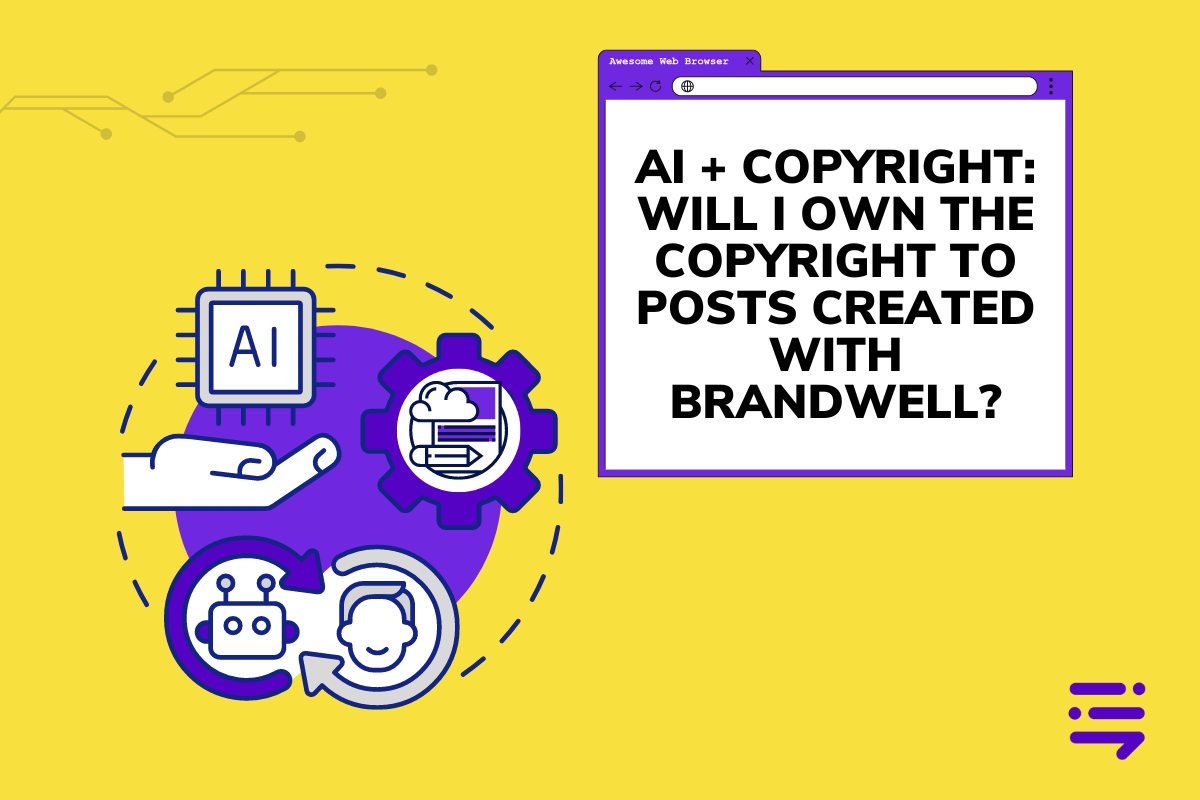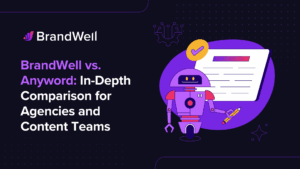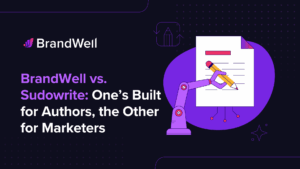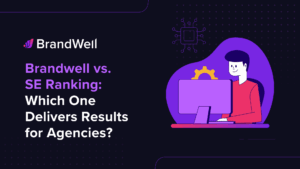AI copyright is a complex, yet fascinating intersection of technology and law.
As a content creator or entrepreneur working with AI, you must be intrigued about how copyright protection applies to works generated by artificial intelligence.
In this article, we’ll discuss what the U.S. Copyright Office says about AI-generated content and how companies selling machine learning software handle copyright protection for original works created by their algorithms.
We’ll focus in particular on BrandWell’s unique approach to granting copyright ownership to you, the human author.
The goal? To provide clarity on why owning copyrights is essential and how it sets us apart from other AI companies in terms of protecting your interests.
Table Of Contents:
- AI Copyright Ownership: Who Owns AI-Generated Content?
- What Does the U.S. Copyright Office Say About AI Content?
- Importance of Owning Copyrights of Your Posts
- BrandWell Gives You the Copyright
- The Bigger Picture: Why We Do What We Do
- Do Other AI Companies Pass the Copyright Down to the User?
- What if AI Inadvertently Copies Someone Else’s Work?
- FAQs – AI Copyright
- Conclusion
AI Copyright Ownership: Who Owns AI-Generated Content?
AI and copyright infringement are two interconnected topics that have gained significant attention in recent years. As AI technology continues to advance, it raises various legal and ethical questions, including those related to copyright-protected data.
Copyright is a legal framework that grants exclusive rights to creators and authors over their original works. It ensures that creators can control and benefit from the use of their creations, such as art, music, literature, or software.
However, with the emergence of AI, questions arise regarding the ownership and protection of works generated by AI systems.
One of the main challenges with AI and copyright lies in determining the authorship of AI-generated content. In traditional creative works, the author is usually an identifiable human being. However, when AI is involved, it becomes more complex.
AI systems can autonomously generate content, such as paintings, music, or even news articles, without direct human intervention. In such cases, it becomes unclear who should be considered the author and rightful owner of the work.
Some argue that the creator or owner of the AI system should be considered the author since they designed or trained the AI to produce the specific output. Others believe that the AI itself should be recognized as the author, deserving its own set of rights. This debate has implications for intellectual property laws and the way we attribute legal protection to AI-generated works.
To further complicate matters, AI systems can be trained on vast amounts of copyrighted material, potentially leading to copyright infringement issues. For example, if an AI model is trained on a dataset containing copyrighted images, there may be concerns about the ownership and usage of the resulting generated images.
What Does the U.S. Copyright Office Say About AI Content?
Dealing with AI-generated content can muddy the waters when it comes to copyright ownership.
The World Intellectual Property Organization says that typically, the creator of a work holds its copyright, but what happens when an AI is involved?
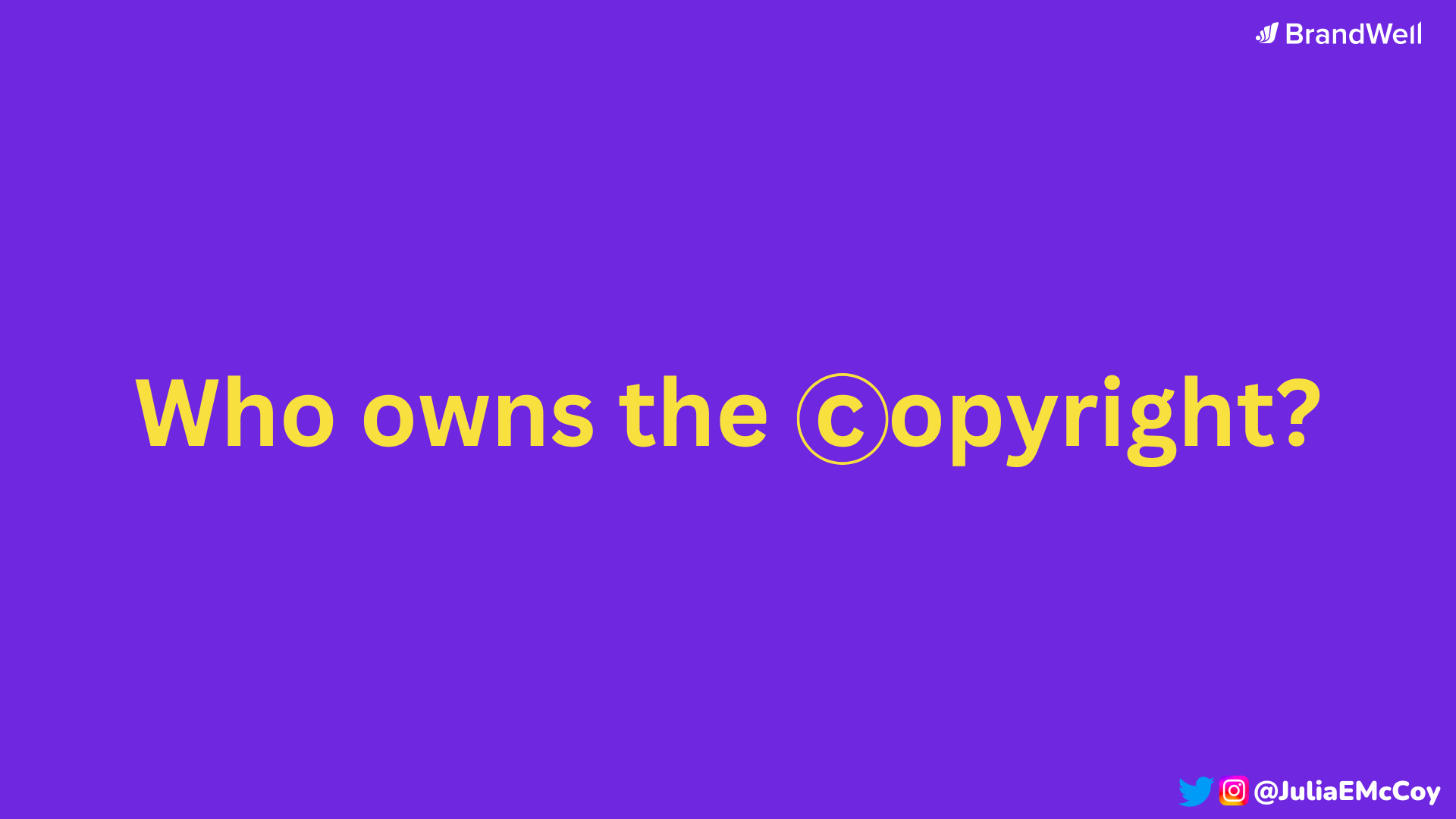
Here’s what the U.S. Copyright Office says about content produced by generative AI:
The US Copyright Office states that the copyright is OWNED BY the creator of the AI. Not the user.
This means we need to think twice before using AI content straight from generators like ChatGPT without editing in books, big pieces attached to our name, etc.
What about the rest of the world?
In some jurisdictions like the United Kingdom, the author gets the copyright, no matter how they write the content.
And the European Union has a Copyright Directive that includes provisions regarding AI-generated content. It stipulates that AI-generated works would not be protected by copyright, but the person who provides the creative input to the AI system would be considered the author. This approach focuses on human involvement while acknowledging the contribution of AI.
What about Google? Does it have a stance on AI content ownership? Read more about what does Google say about AI content and AI labeling.
Importance of Owning Copyrights of Your Posts
When you own the copyright, you have absolute authority over how your content is used and shared.
Owning the copyrights of your posts — whether written by a human or machine — gives you the ability to customize, share, and even monetize them.
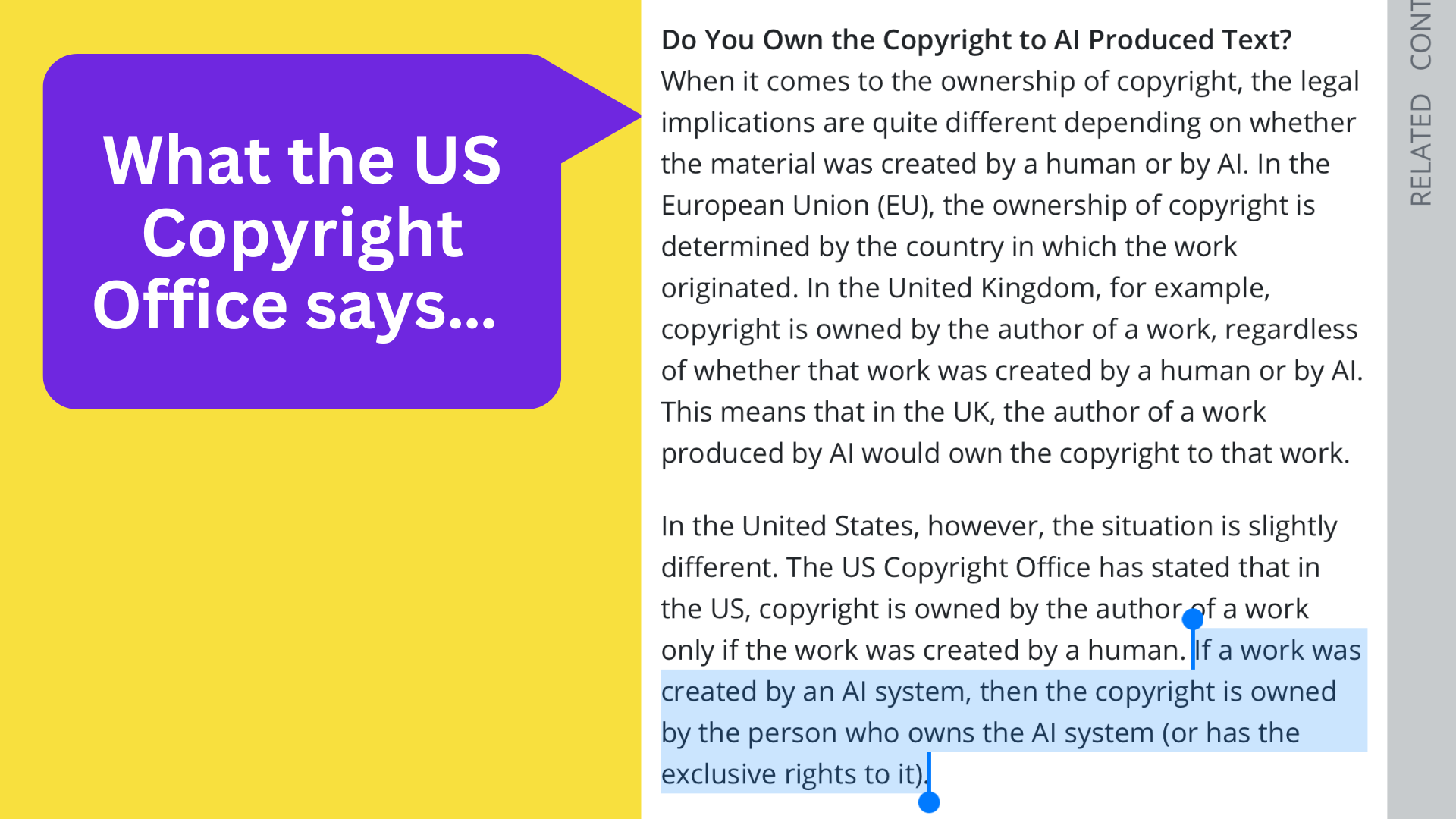
BrandWell Gives You the Copyright
Regardless of where you’re located, if you use BrandWell, we always pass the copyright on to you — the user.
Because at BrandWell, we believe in empowering you with full control over your content.
This means that any material generated through our platform is yours and only yours.
Why do we grant users full control of their content?
Owning the copyright to your posts brings several benefits to the table:
- Freedom of use: You can freely publish, distribute, or modify your content without worrying about infringement issues.
- Economic rights: As a copyright owner, you have exclusive rights to commercialize your work. This includes selling it or licensing it out for profit. Learn more about economic rights here.
- Moral rights: These include being credited as an author whenever and wherever your work is used.
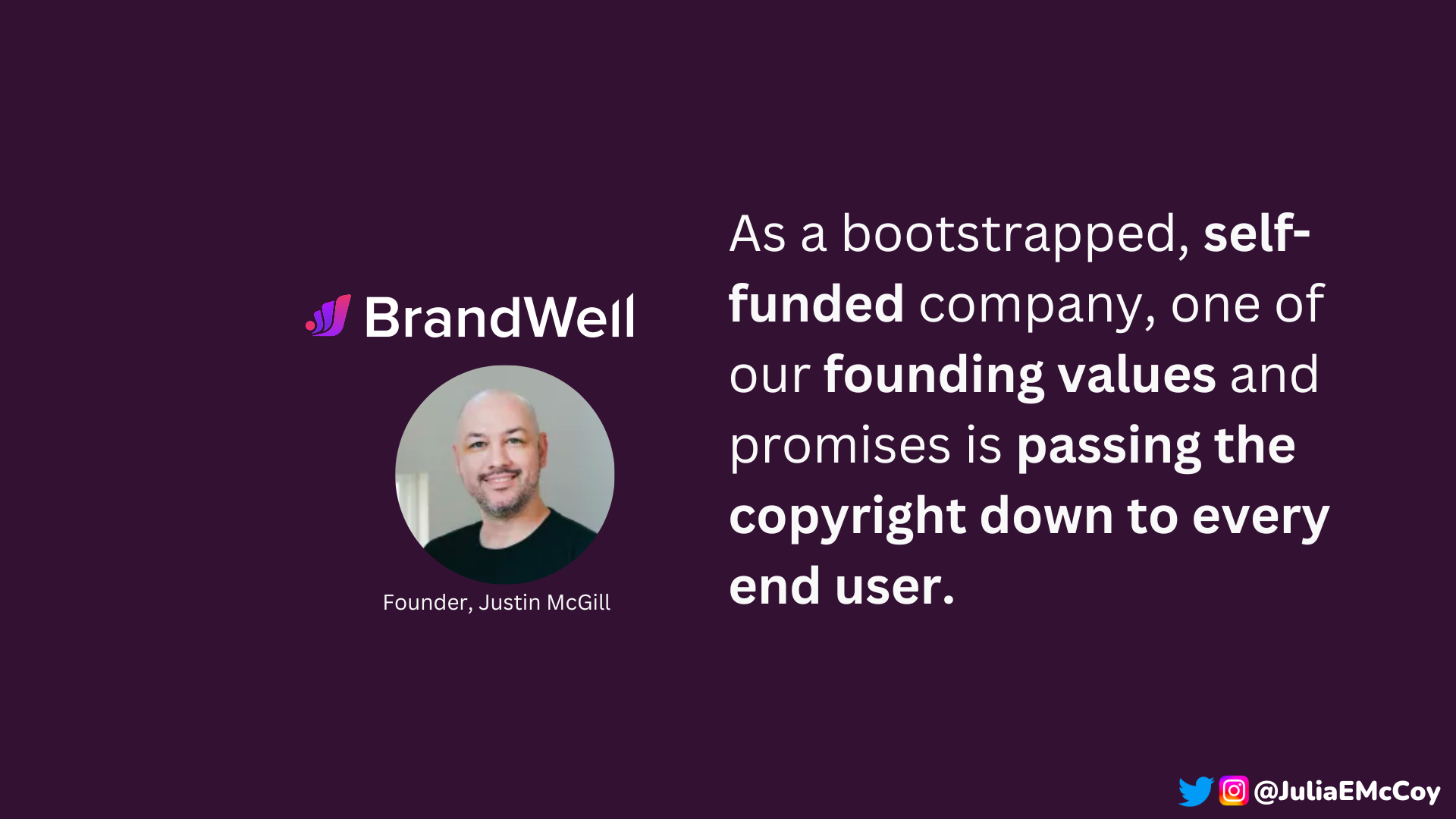

The Bigger Picture: Why We Do What We Do
The decision to grant full copyrights isn’t just because we’re nice (although we are). It’s also rooted in our core values and business model.
- We believe that creators should reap all rewards from their hard work. That’s why every piece of AI-generated content created on our platform belongs solely to its human creator.
- Our business model revolves around providing value-added services, not owning user-generated content. Our success lies in helping you succeed.
- In essence, by granting full copyrights, we aim to foster creativity while ensuring fairness and respect for intellectual property.
Do Other AI Companies Pass the Copyright Down to the User?
Not at all.
Many AI companies keep the rights over content generated by their platforms, which can be a big concern for users who value intellectual property control.
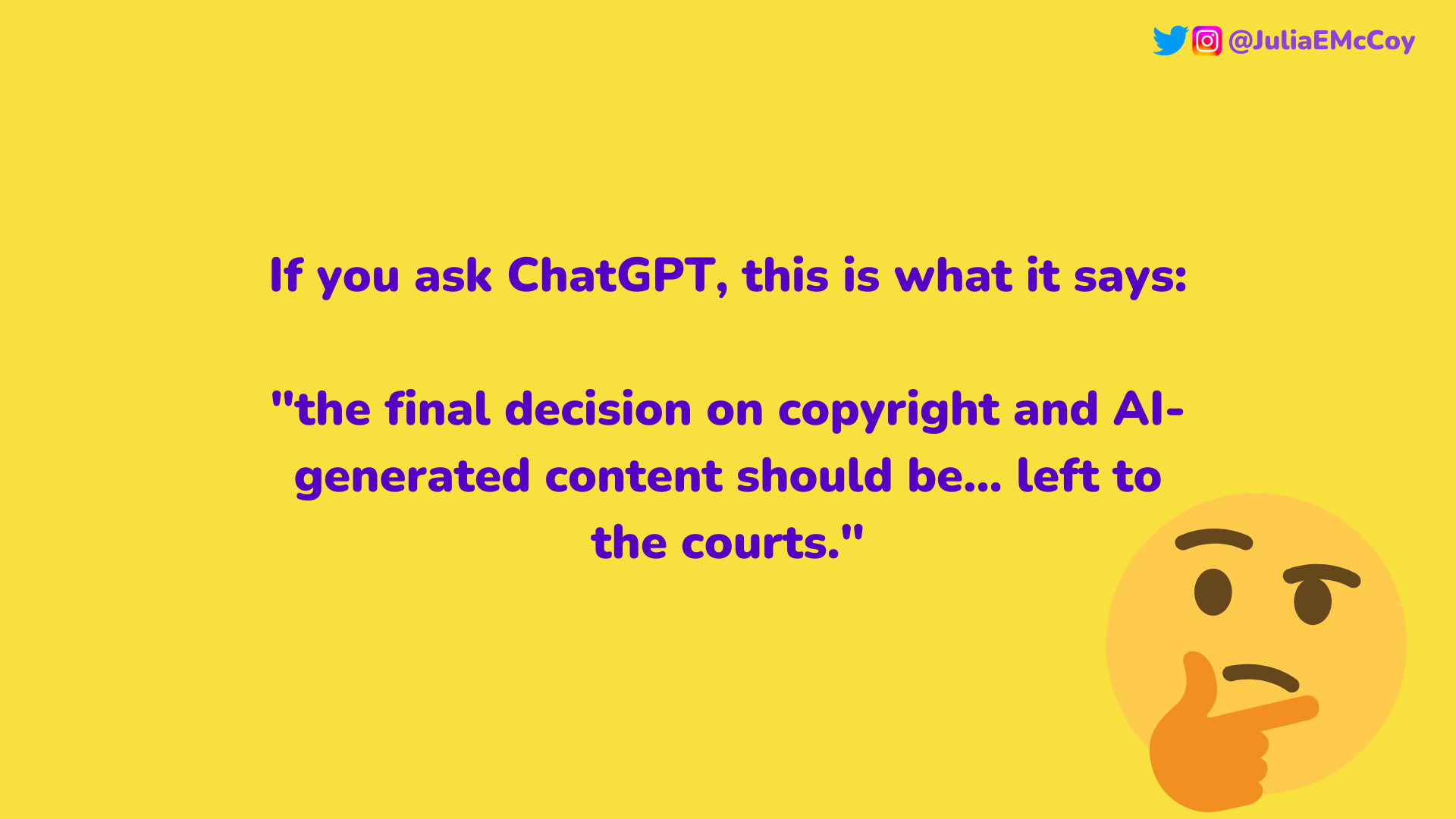


It’s common for AI firms to hold onto copyrights, meaning any material you create using their platform technically belongs to them and not you.
The implications? You might find yourself in hot water if you use this content commercially without proper permissions or licenses from these companies.
Take ChatGPT, for example. This impressive language model developed by OpenAI doesn’t make it clear whether users own the copyright of posts created with its help, leaving users in a gray area when it comes to legalities.
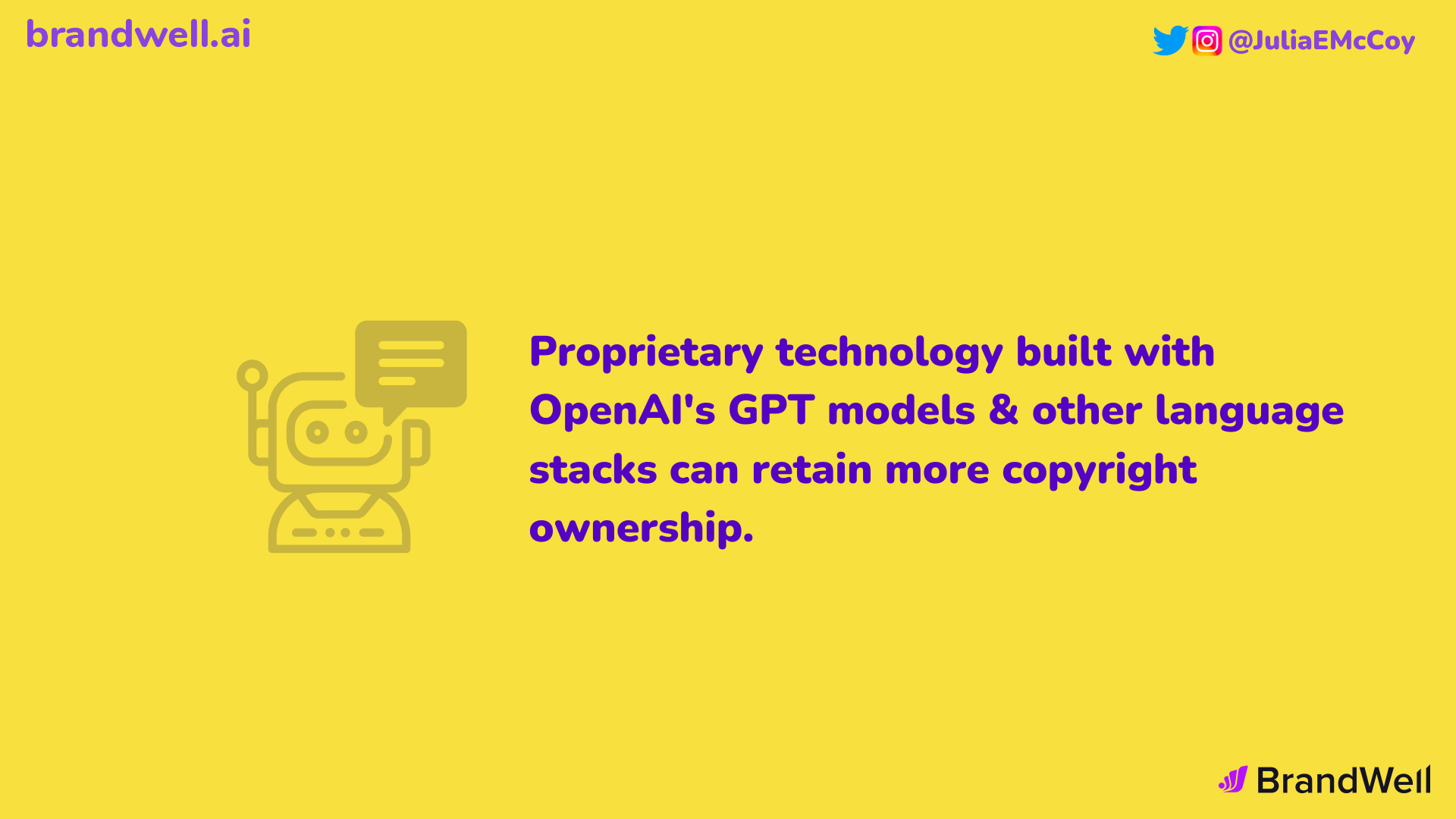

BrandWell does not use ChatGPT to create its content. Instead, we own a proprietary stack of 3 natural language processing (NLP) algorithms and our own semantic search crawler.
We prioritize the ownership of your work by transferring the full copyright to you. This way, there are no ambiguities or uncertainties about who owns what — everything produced through our platform is yours alone.
In essence: We empower YOU with total control over YOUR content.
So next time someone asks you what sets BrandWell apart from other AI tools, remember this key difference: While they may generate great text like us, they keep a tight grip on your creativity.
Don’t let anyone else dictate terms for YOUR creations. With BrandWell, enjoy freedom and peace of mind knowing every word penned is completely yours.
What if AI Inadvertently Copies Someone Else’s Work?
Here’s a more controversial issue when it comes to AI copyright — chatbots pulling information from existing materials and accidentally infringing on copyrighted work.
Actors, authors, musicians, and even media entities are ready to sue multiple generative AI platforms for potential intellectual property infringement caused by AI-generated content.
Author and comedian Sarah Silverman has taken legal action against OpenAI and Meta for using her memoir, “The Bedwetter,” without her permission.
The New York Times also threw down the gauntlet by suing OpenAI and Microsoft for dipping into copyrighted material for their AI training.
Now, the Authors Guild is stepping up to the plate with an open letter signed by over 8,500 authors, big names like Margaret Atwood, Dan Brown, and Jodi Picoult among them. They’re telling tech bigwigs behind ChatGPT and Bard to stop using their books for training or pay up.
And here’s the kicker: Authors are worried that this whole AI gig might flood the market with machine-written content, putting their livelihoods at risk. Just recently, Amazon had to crack down on AI authors spamming the bestseller lists with their generated works.
In the art world, Getty Images and Stable Diffusion are going to trial as a UK court found merit in Getty’s accusation that its library of copyrighted images was swiped to train the Stability AI model.
Visual artists Sarah Andersen, Kelly McKernan, and Karla Ortiz also sued Midjourney, Stability AI, and DeviantArt for using their work to train their AI image generators. A California federal court judge dismissed parts of the lawsuit but allowed the plaintiffs to file a new complaint.
As the legal battles over AI copyright continue to unfold, it’s becoming increasingly clear that the intersection of artificial intelligence and intellectual property rights is a complex and evolving landscape. These cases involving AI-generated content and the unauthorized use of copyrighted material highlight the urgent need for clearer regulations and ethical guidelines.
As technology advances and AI becomes more integrated into various industries, it’s essential for policymakers, content creators, and tech companies to collaborate in shaping a framework that respects both innovation and intellectual property rights, ensuring a fair and equitable digital future for all stakeholders involved.
FAQs – AI Copyright
Is AI content copyrighted?
Yes, AI-generated content is subject to copyright laws, but ownership usually belongs to companies selling machine learning software.
Do copyright laws apply to AI?
Absolutely, copyright laws apply to AI-generated works, but it’s a complex area with ongoing legal debates.
Do you own the copyright to AI art?
In most cases, you only own the copyright to AI art if you modified or edited the AI output significantly.
How does AI impact copyright?
AI challenges traditional notions of authorship and creation since it can generate unique content on its own, without human intervention.
Conclusion
It’s worth noting that the topic of AI and copyright is still evolving, and different jurisdictions may adopt varying approaches.
As AI technology progresses and societal norms continue to evolve, there will likely be ongoing discussions and debates on how best to navigate the intersection of AI and copyright, ensuring fair protection for creators while promoting innovation in AI-driven creativity.
At BrandWell, we believe that you should own the rights to any content generated using our platform. It might seem like common sense, but surprisingly not all companies share this viewpoint.
Our aim is to provide users with the power of ownership over their intellectual property rights when creating content through our service.
In other words: if you use our service to create a post or article, then congratulations. You now hold the copyright for that piece of content.
Don’t settle for less — choose BrandWell for peace of mind and full control over your content’s use.

